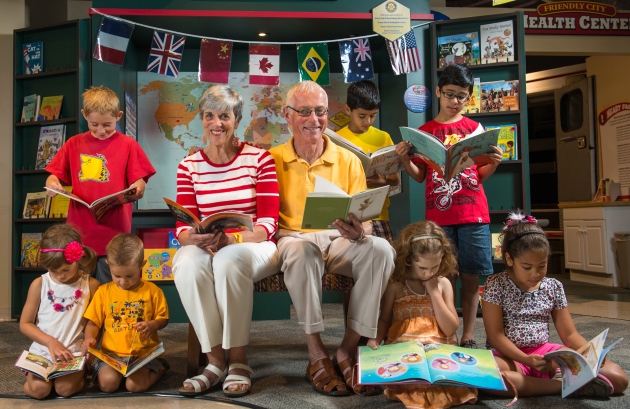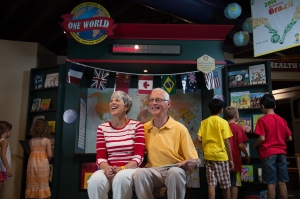A pocketful of quarters
February 12, 2015 1 Comment
Today we feature not a student, alumnus, or faculty member but a James Madison University parent who is Being the Change…..
 It’s mid-morning in Lawrence, Massachusetts. Sunlight shimmers through the trees. The air is warm, and parents and children are milling around the local farmers’ market when a car pulls up to the curb and a woman steps out. A little buzz rustles through the crowd. She’s here! The woman carries a brightly colored quilt and pulls a cart overflowing with books. Soon, like the Pied Piper, she gathers an audience of children who jockey for spots on and around her quilt.
It’s mid-morning in Lawrence, Massachusetts. Sunlight shimmers through the trees. The air is warm, and parents and children are milling around the local farmers’ market when a car pulls up to the curb and a woman steps out. A little buzz rustles through the crowd. She’s here! The woman carries a brightly colored quilt and pulls a cart overflowing with books. Soon, like the Pied Piper, she gathers an audience of children who jockey for spots on and around her quilt.
They have come to hear her stories…
 Twelve years ago, after a career in marketing and software development, Nicolette Nordin Heavey enrolled in a storytelling class at a local community college. “It sounded fun,” she says.
Twelve years ago, after a career in marketing and software development, Nicolette Nordin Heavey enrolled in a storytelling class at a local community college. “It sounded fun,” she says.
It was a natural fit for a mom of three who grew up surrounded by a culture that valued the art of storytelling. Nicolette, whose English mother and Swedish father provided her with a childhood spent partly in Belgium, England, and Saudi Arabia, was greatly influenced by diverse cultures and by the strong aural tradition of storytelling. Europeans, more than Americans, she says, preserve their history and culture through telling stories. It became a part of her — a part she shared with her three children, including her daughter, Devon, who is a freshman at JMU.
“I would be the mom in the back of the bus telling stories during school field trips,” she says.
After finishing the storytelling class, Nicolette tried out her newly-honed skills at preschools and day care centers, where she discovered that her passion for storytelling was also a tremendous opportunity.
She received a call from a social services agency in Lawrence, Mass., asking for her help in developing a literacy outreach program. The project was a family and community engagement initiative, funded by a grant from the national program Race to the Top.
 Stories in the Street, a grant funded literacy initiative, was born out of this association, and Nicolette Nordin Heavey had serendipitously embarked on a second career that would change lives.
Stories in the Street, a grant funded literacy initiative, was born out of this association, and Nicolette Nordin Heavey had serendipitously embarked on a second career that would change lives.
The choice of Lawrence was strategic, she says. With a poverty rate exceeding 60 percent, it is the poorest city in Massachusetts. And there is a clear — and negative — correlation between poverty and literacy.
Nationwide studies indicate that children from lower socioeconomic status homes lag significantly behind their peers in language skills. Much of the disparity stems from the fact that these children simply hear fewer words during the critical birth to age 4 period.
The disparity is startling.
Researchers estimate that by age 3 children from impoverished communities have heard 30 million fewer words than children from higher-income homes. Experts call it the 30-million word gap, and it is a serious problem because children do not catch up.
Nicolette knows that early language exposure is not just a nicety; it’s a lifeline to success. But because not all children are similarly blessed, she says: “You have to go to them, and storytelling is a perfect means for that. All you need is a portable mic and a colorful quilt.”
“When I first began storytelling on the street, people looked at me like I was on Candid Camera,” she says. “But soon, they began to expect me. By the end of the summer, people were waiting for me to show up.”
To offer Stories in the Street, Nicolette (and now four other storytellers who work with her) fan out throughout Lawrence. In a normal week, Nicolette will visit and “tell” at two regular spots, like a park or a farmers market, and she’ll choose a third, random location. It might be a basketball court or playground — anywhere that children gather.
 One story Nicolette likes to tell is about a lion and and a mosquito.
One story Nicolette likes to tell is about a lion and and a mosquito.
“I get to introduce words like ‘Serengeti,’” she says. At more-affluent schools, children who are asked where lions live might shout out “Africa!” or even “the Serengeti!” she says. Students with broader experiences and more exposure to literature know this.
But ask the same question in Lawrence or any socioeconomically disadvantaged community, she says, and children are more likely to say: “In the zoo.”
Nicolette introduces and defines new words by association. She explains: “In telling my story about the lion and the mosquito, I use the word ‘thirsty’ three times. Children understand this. The fourth time, I might say, ‘And the lion was thirsty. He was so thirsty, he was parched,’ exposing them to a new word.”
While storytelling infuses lower-income communities with literacy tools, it also benefits children in another way.
In the Hart/Risley study, which identified the 30-million word gap, researchers found a disparity in encouraging feedback — positing, perhaps, yet another benefit to storytelling: hope. Without dreams, no child succeeds…and storytelling — that simple and comfortable conveyance of stories — seeds dreams.
Stories on the Street, which is entirely grant-funded and became a nonprofit this year, has seen its funding increase four-fold over the past five years, one clear indication of both success and need.
Stories in the Street and similar programs also create a sense of community, so it’s not only the children who are eager to see Nicolette arrive. One elderly man, an employee of the city’s public works department, helped her load and unload her car at a farmers’ market.
 “He also helped me with my cart filled with books,” she says. When she asked him why, his reply was affirming: “We need people like you.”
“He also helped me with my cart filled with books,” she says. When she asked him why, his reply was affirming: “We need people like you.”
For the rest of the summer, he manned Nicolette’s parked car, feeding the meter with a pocketful of quarters to make sure she didn’t get a ticket. And the children left each storytelling session with new words, a book of their own from Nicolette’s cart, and dreams inspired by stories they heard in the street.
To read more about the 30-million word gap, go to the American Educator’s story, “The Early Catastrophe” by Betty Hart and Todd R. Risley.
To learn more about Stories in the Street, visit Nicolette’s website: http://www.nicolettestory.com




Recent Comments